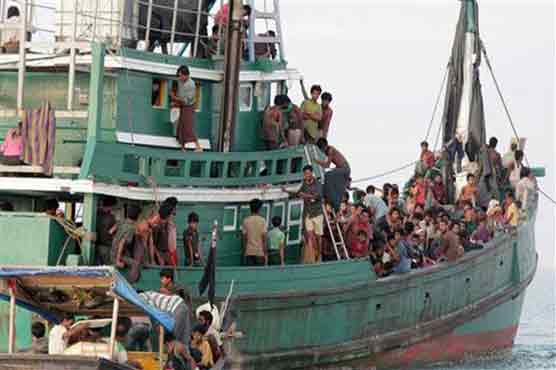Indonesia, Malaysia to help Muslim migrants stranded at sea

Anifah said Malaysia and Indonesia invite other countries in the region to "join in this endeavor."
PUTRAJAYA, Malaysia (AP) - Indonesia and Malaysia agreed Wednesday to provide temporary shelter to thousands of migrants believed to be stranded at sea, a potential breakthrough in the humanitarian crisis confronting Southeast Asia after weeks of reluctance by the region s nations to take responsibility.
The announcement was made by Malaysian Foreign Minister Anifah Aman after a meeting with his counterparts from Indonesia and Thailand called to address the plight of the migrants. Most of them are the long-persecuted Rohingya Muslim minority in Myanmar and others are Bangladeshis fleeing poverty.
"Indonesia and Malaysia agreed to continue to provide humanitarian assistance to those 7,000 irregular migrants at sea," Anifah told reporters, reading from a statement. He said the two countries "also agreed to provide them temporary shelter provided that the resettlement and repatriation process will be done in one year by the international community."
A few thousand migrants have already made it to shore in Indonesia s Aceh province and Malaysia s Langkawi island. About 450 were rescued by Indonesian fishermen on Wednesday and brought ashore.
He did not say if the refugees would still be accepted even if there was no cooperation from the international community, or when the humanitarian process will start. Also, it is not clear how the three governments reached the figure of 7,000 refugees. The U.N. refugee agency believes there are some 4,000 at sea although some activists had initially put the number at 6,000.
Anifah said Malaysia and Indonesia invite other countries in the region to "join in this endeavor."
Significantly, the agreement does not include Thailand even though it participated in the talks. Thailand has previously said it cannot afford to take any more migrants since it is already overburdened by tens of thousands of other refugees from Myanmar.
Most of the refugees stranded on big boats in the Andaman Sea are believed to be victims of human traffickers, who entice them in Myanmar s Sittwe province and in Bangladesh with promises of passage to Malaysia and jobs once they land there.
But in reality, they are held for ransom, either on the trawlers or in jungle camps in Thailand through which they transit before slipping into neighboring Malaysia. The victims then have to ask their relatives back home to give money to the smugglers in return for their freedom.
"The enforcement agencies of the countries concerned will continue to share intelligence information in their efforts to combat people smuggling and human trafficking," Anifah said.
Anifah also urged the international community to "uphold their responsibility and urgently share the burden of providing the necessary support to Malaysia, Indonesia and Thailand in addressing the problem."
He said it was also decided in the meeting to address the "root causes" of the problem, which should be "addressed by all parties concerned." But the statement did not name Myanmar, which refuses to recognize Rohingya as citizens and says it will not take blame for their exodus. The cautiously worded statement highlighted the sensitivities at play in the region where countries are loath to criticize each other.
Anifah said the three countries propose that the international community provide them with financial assistance to enable them to help the migrants who would be sheltered in a designated area to be agreed by the affected countries and administered by a joint task force.
The international community should also take responsibility for the repatriation of the migrants to their countries of origin or resettlement in the third countries within a period of one year.

